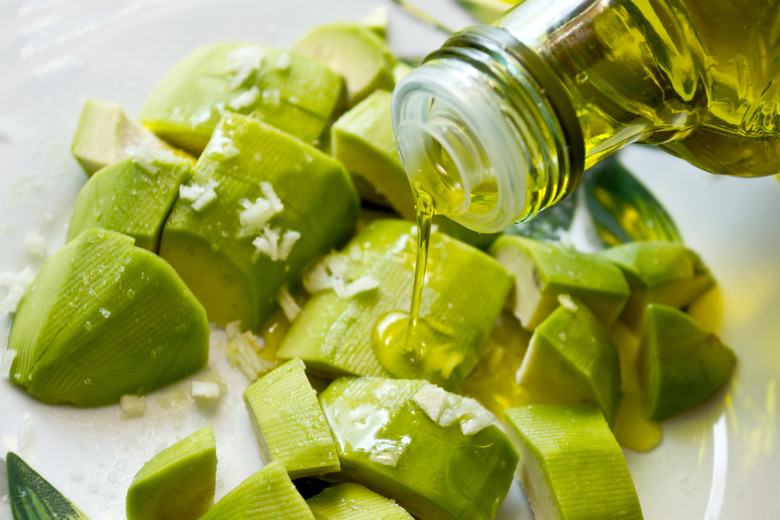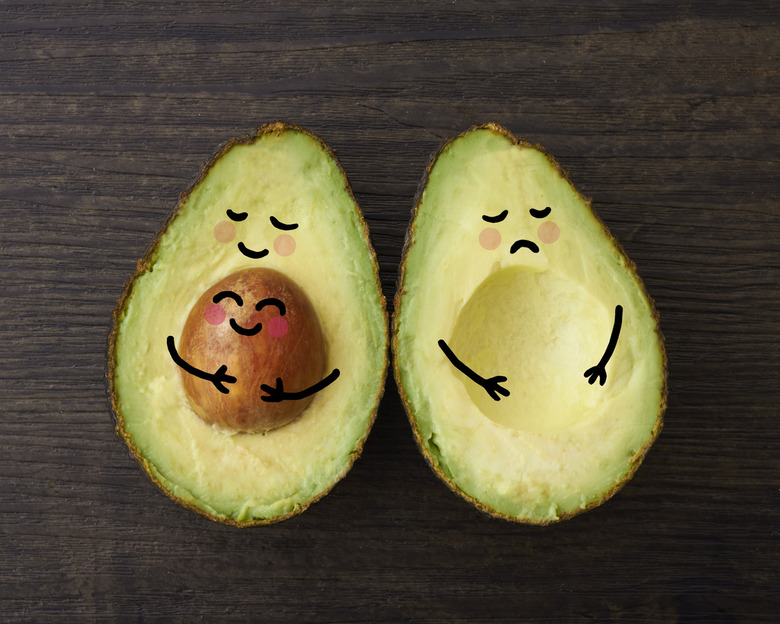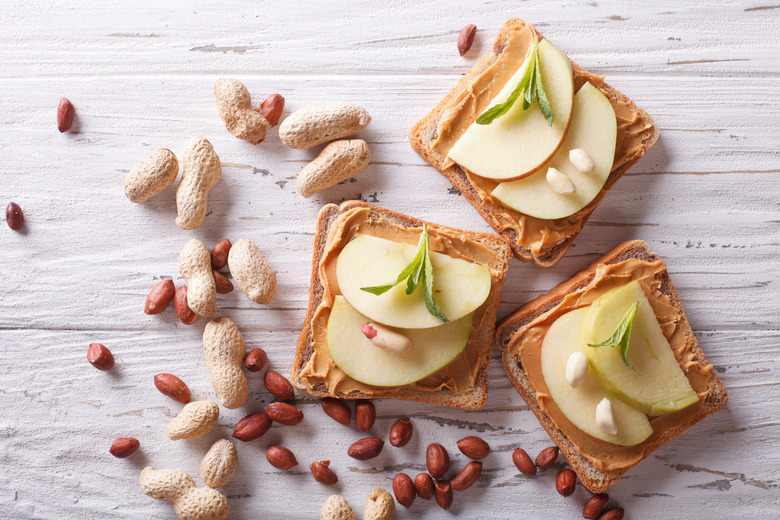Surprising Reasons You Should Eat More Fat
If you were around to witness the dieting trends of past decades, you might have heard the many warnings against eating too much fat. But if you follow modern trends, you've probably heard of the high-fat, low-carb diets of today such as paleo and keto. While these trendy diets do have their own hidden dangers, they do get something right: Fats are really good for you.
Dietary fat — the kind you get from nuts, seeds, cheese, egg yolks and many other foods — is a much different beast than the fat that shows up beneath your skin. Fats in food play a number of important roles in the functioning of your body every single day. Diets applauded as generally successful and health-promoting, such as the Mediterranean diet, have fats as a central staple.
There are a few different types of fat to consider: unsaturated fats, saturated fats and trans fats. Only one of these fats should be avoided entirely: trans fats. Foods with trans fats typically include pre-packaged and processed sweets, fried foods and margarine. Trans fats have been linked to a number of adverse health effects including cancer and have even inspired some legal action to ban these fats from public consumption.
But you probably eat the other types of fats, unsaturated and saturated, every day. And that's a good thing! Here are some of the biggest health benefits of eating more fats.
Fats could make you smarter
Do you ever feel like your brain is foggy, or like you just can't concentrate? You might not be eating enough fat. Your brain relies on fat to function. One of the biggest tips from neurologists on how to improve brain health is to eat healthy fats, including omega-3s and omega-6s. So if you're about to take an exam or want to boost your memory, eat some nuts or avocado for a snack.
You need fats to breathe
It sounds dramatic, but it's true. Your lungs are coated with a substance made of saturated fat — the kind found in full-fat dairy, butter and coconut. If you don't eat enough saturated fat, your lung health could suffer. Studies have begun to look into links between fat consumption and asthma and have discovered some connections.
Fats help your body stay warm
This isn't referring to the fat on your body, though that also helps keep you warm. No matter how much fat is on your physical body, eating dietary fats is important for your body to perceive warmth. Ever wonder what your body is trying to tell you with the weird symptom of feeling cold all the time, even when your surroundings are warm? Turns out, it's a telltale sign of dietary fat deprivation.
Fats help keep your reproductive system healthy
Fat intake is crucial for keeping your hormones balanced — which, in turn, helps keep your reproductive system healthy. Both men and women use dietary fat to manufacture sex hormones like estrogen and testosterone. In some extreme cases, studies suggest that restriction of dietary fat can result in infertility.
Fat helps you absorb nutrients
Certain vitamins are fat-soluble, meaning dietary fat is necessary in order to fully absorb them through digestion. Without the fat, you're missing out on vitamins, too, which is why adding some form of fat to every nutritious meal is probably a good idea.
Fats can help lower cholesterol
Dietary fat and cholesterol have a long and complicated history, but most modern recommendations say that eating a small amount of saturated fats and a larger amount of unsaturated fats can help improve your cholesterol levels. The Heart Foundation says that these healthy fats increase the amount of "good" cholesterol and lower the amount of "bad" cholesterol in your blood. Studies suggest that even some nutrient-rich foods that have saturated fats, such as eggs, could be helpful for improving cholesterol when eaten in moderation.
Fats help lower your blood pressure
While sodium-heavy foods such as bacon and cheese could send your blood pressure through the roof if you eat them too often, fatty foods in general are a good idea to keep in your diet. Studies show that increasing fat intake (especially monounsaturated fats) may help to lower blood pressure. Olive oil in particular is one of the healthiest foods for your blood pressure, according to a growing body of research.
Fats can help prevent cancer
Cancer-causing habits involve more than just diet; genetics, environment and pure chance all play a large role as well. But eating foods that could help prevent cancer is never a bad idea for lowering your risk. Studies have shown that higher intake of dietary fats could prevent prostate cancer in men. Research also suggests that for women, increasing fat intake can help to stave off breast cancer.
Fats can improve your skin
The best diet for healthy, glowing skin involves eating dietary fats. So if you want healthy-looking skin year-round, make sure you eat enough fats — and not just from avocados. While unsaturated fats, such as those from avocados and olive oil, are important for preventing wrinkles and keeping your skin bright, saturated fats are necessary, too. Both types of fats are used by the body to generate new skin cells to replace those that are worn out or dead.
Fats can make your hair shinier
In order for your hair to grow faster and end up feeling stronger, your body needs the proper nutrients to create healthy cells. Healthy fats help your body absorb vitamins and minerals that nourish your scalp from the inside, giving you shinier, healthier-looking locks.
Fats help to stave off depression
There are many factors that determine whether or not a person becomes clinically depressed; so if your loved one struggles with depression, it's probably not due to their diet. However, food and nutrition does play a role. Dietary fat can actually ward off depression, according to some studies. Fats can help with the production of chemicals like serotonin and dopamine, both of which alter the brain chemistry of a person with depression.
Fats can help prevent diabetes
Nutritionists often recommend eating carbohydrates alongside other nutrients such as protein and fats, and with good reason. One of the things you may not know about diabetes and diet? Eating a diet that incorporates healthy fats can help improve insulin sensitivity, according to some studies. Other research showed that eating dietary fats helped maintain better blood sugar control. Both of these factors (insulin sensitivity and blood sugar control) are key components in diabetes prevention.
Fats can reduce inflammation
Inflammation is the body's reaction to stressors, which can include anything from pollution to high-intensity exercise. Over the short term, inflammation is benign, but if it becomes chronic, inflammation can lead to serious and sometimes deadly diseases such as cancer. Poor diet can cause inflammation; it's wise to avoid eating the most inflammatory foods on a regular basis. However, some foods can actually be anti-inflammatory, meaning that they help combat this caustic reaction. Studies show that those who eat a diet high in unsaturated fats have lower levels of inflammatory markers in their blood.
Fats help you live longer
Longevity is a complicated subject, and it seems like some of the world's longest-lived people have some of the oddest, unhealthiest habits. But those are the outliers. Studies show that, on the whole, those who eat dietary fat actually live longer than those who eat low-fat diets.
Fats help keep your metabolism working
One of the hidden side effects of popular diets such as a low-fat diet is that they can really mess with your metabolism. A study published in JAMA showed that of all diets tested, low-fat diets caused the greatest decrease in metabolic rate. To keep your metabolism going, make sure to avoid unhealthy habits that may slow it down, such as binge drinking, eating a diet low in important nutrients and failing to get enough sleep. Oh, and eat your healthy fats! They're good for you.
Fats make food taste better
Facts are facts: Cooking food in fat such as butter or oil just makes it taste way better. And the taste of your food really does matter when it comes to your health. Studies show that your body absorbs more nutrients from food when you enjoy eating it. Plus, enjoying food is good for your mental health and can help you eat more mindfully to stay in tune with your hunger cues.
Fats are good for your heart
Sure, some fatty foods like burgers and french fries aren't great for your ticker, but a moderate and sufficient amount of dietary fat is crucial for maintaining heart health. In fact, diets focused on moderate fat consumption such as the Mediterranean diet have been shown in some studies to reduce the likelihood of cardiac arrest and other cardiovascular incidents. Of course, some of this is dependent on the types of fats consumed. Trans fats, for instance, have been shown to negatively affect risk factors for heart disease. Cardiologists recommend eating a larger amount of unsaturated fats, such as those from olive oil and avocado, than saturated fats, such as those from butter and animal products. There's a reason almonds, avocados and olive oil are among the best foods you can eat for your heart.
More from The Daily Meal:
Unexpected Signs of an Unhealthy Heart
Hidden Dangers of the Keto Diet
19 Health Myths You Should Stop Believing Right Now

















